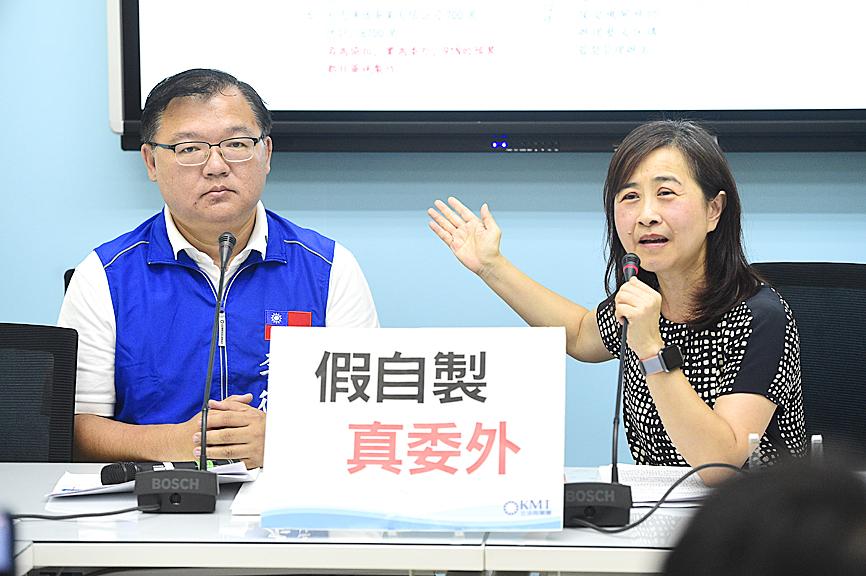Chinese Television Systems (CTS) officials yesterday rejected accusations by Chinese Nationalist Party (KMT) lawmakers that the public channel had contravened government procurement regulations on NT$96 million (US$3.25 million) production budget from the Ministry of Culture.
KMT legislators Lin Yi-hua (林奕華) and Lee De-wei (李德維) had earlier told a media briefing that CTS was given the money to produce its own programs, but had awarded programming contracts to firms with connections to CTS executives.
“The Ministry of Culture signed an agreement for CTS to produce its television programs with the NT$96 million subsidy. The agreement stated that CTS must invite bid by open tender, but it did not do so,” Lin said.

Photo: George Tsorng, Taipei Times
“Instead, CTS gave production projects directly to five outside companies, which received a total of NT$87 million, or 91 percent of the ministry’s subsidy,” Lin said. “We suspect CTS officials handed the projects to companies operated by their friends.”
CTS, one of the nation’s three oldest terrestrial TV networks, was founded in 1971 and was controlled by the Ministry of National Defense, which staffed all of its divisions with military personnel, until the channel was incorporated into the public Taiwan Broadcasting System (TBS) in 2006.
“TBS must raise its standards for adhering to proper procedures. We demand an investigation by the government ethics office, since CTS had deviated from the procedures the culture ministry stipulated in the agreement,” Lee said.
CTS issued a statement rejecting the accusations.
“We followed the proper procedures as stated in the agreement, which outlined our ‘own production, with outside collaboration for filming.’ Numerous meetings were convened by an ad hoc committee during the planning and initial stages, with two committee members from CTS and three from outside,” the statement said.
“Through the filming and production stages, Ministry of Culture officials were informed about the collaboration with outside companies and the division of work for the projects,” it said.
“The whole process adhered to the law, and conformed to strict internal control and oversight by CTS, although some phases in the process might have had shortcomings,” it said. “However, the lawmakers’ accusation that CTS had ‘handed out contracts to companies in an illicit manner’ is incorrect, as such actions did not take place.”
The Ministry of Culture issued its own statement, saying: “All the programming projects under the CTS agreement complied with the Government Procurement Act (政府採購法).”
“CTS, as a member of TBS’ public television service, needed to expand its programming in Taiwanese [also known as Hoklo], both for better quality and more variety of programming, as well to support the ‘Taigi Channel’ (台語台) under the Public Television Service,” it said.
“Therefore the ministry helped to obtain the funding, and abided by the professionalism and programming production of works under taken by CTS. These projects have been completed, with proper checks on accounting and verification of expenses in the finalized reports, in accordance with the Government Procurement Act,” the culture ministry statement said.

US climber Alex Honnold is to attempt to scale Taipei 101 without a rope and harness in a live Netflix special on Jan. 24, the streaming platform announced on Wednesday. Accounting for the time difference, the two-hour broadcast of Honnold’s climb, called Skyscraper Live, is to air on Jan. 23 in the US, Netflix said in a statement. Honnold, 40, was the first person ever to free solo climb the 900m El Capitan rock formation in Yosemite National Park — a feat that was recorded and later made into the 2018 documentary film Free Solo. Netflix previewed Skyscraper Live in October, after videos

NUMBERS IMBALANCE: More than 4 million Taiwanese have visited China this year, while only about half a million Chinese have visited here Beijing has yet to respond to Taiwan’s requests for negotiation over matters related to the recovery of cross-strait tourism, the Tourism Administration said yesterday. Taiwan’s tourism authority issued the statement after Chinese-language daily the China Times reported yesterday that the government’s policy of banning group tours to China does not stop Taiwanese from visiting the country. As of October, more than 4.2 million had traveled to China this year, exceeding last year. Beijing estimated the number of Taiwanese tourists in China could reach 4.5 million this year. By contrast, only 500,000 Chinese tourists are expected in Taiwan, the report said. The report

Temperatures are forecast to drop steadily as a continental cold air mass moves across Taiwan, with some areas also likely to see heavy rainfall, the Central Weather Administration (CWA) said. From today through early tomorrow, a cold air mass would keep temperatures low across central and northern Taiwan, and the eastern half of Taiwan proper, with isolated brief showers forecast along Keelung’s north coast, Taipei and New Taipei City’s mountainous areas and eastern Taiwan, it said. Lows of 11°C to 15°C are forecast in central and northern Taiwan, Yilan County, and the outlying Kinmen and Lienchiang (Matsu) counties, and 14°C to 17°C

STEERING FAILURE: The first boat of its class is experiencing teething issues as it readies for acceptance by the navy, according to a recent story about rudder failure The Hai Kun (海鯤), the nation’s first locally built submarine, allegedly suffered a total failure of stern hydraulic systems during the second round of sea acceptance trials on June 26, and sailors were forced to manually operate the X-rudder to turn the submarine and return to port, news Web site Mirror Daily reported yesterday. The report said that tugboats following the Hai Kun assisted the submarine in avoiding collisions with other ships due to the X-rudder malfunctioning. At the time of the report, the submarine had completed its trials and was scheduled to begin diving and surfacing tests in shallow areas. The X-rudder,